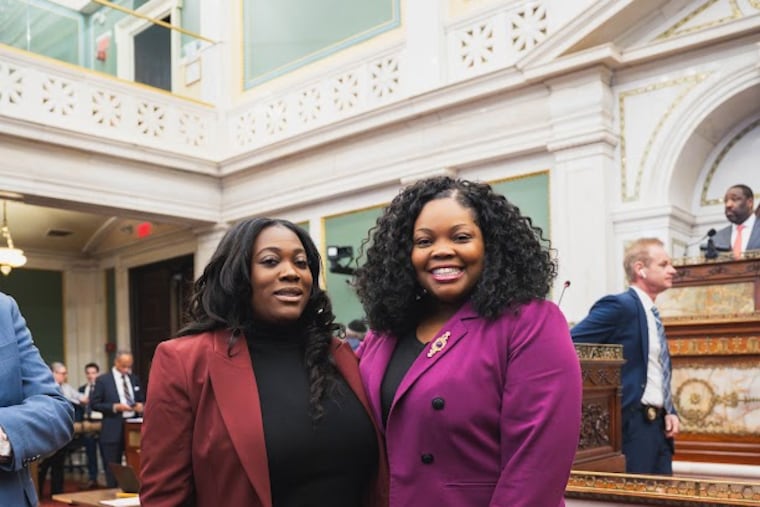For Black women, giving birth carries a high risk of death. Advocates are spending a week raising awareness and looking for solutions from Harrisburg
“What’s next? I don’t want to leave hope on the steps of the Capitol.”

Saleemah McNeil remembers when she was 19, giving birth, and coming out of labor the survivor of a traumatic birth experience. Now, the Oshun Family Center she founded as a consequence of that is leading Philadelphia’s plans for the seventh annual national Black Maternal Health Week (BMHW) which runs April 11-17.
For Black women, giving birth carries with it a risk of death three times higher than that for white women, according to the Centers for Disease Control and Prevention, and the week is intended to bring a national spotlight to what is needed to keep Black women from dying or experiencing serious medical problems during childbirth.
“My son had a traumatic entry into earth and it was really hard [for me],” McNeil said.
Although she had family support, McNeil didn’t have the mental health resources she truly needed to cope with the trauma, so she decided to train as a reproductive psychotherapist and to create the resources she wished she had had — at Oshun Family Center every therapist is trained in treating perinatal mood and anxiety disorders in a culturally sensitive way.
Raising awareness of a crisis
The Black maternal mortality public health crisis has been escalating for decades. In 1987, the overall mortality rate was 6.6 per 100,000 births. By 2020, it had soared to 23.8 per 100,000 births, according to the Centers for Disease Control and Prevention. Black women are three times as likely to die from pregnancy-related complications as white women.
» READ MORE: America’s racist maternal mortality crisis traces back to Philadelphia
City Councilmember Katherine Gilmore Richardson, who has shared her own traumatic birth story, cited in her resolution recognizing Black Maternal Health Week that “the high rates of maternal mortality among Black women span across income levels, education levels, and socioeconomic status.”
“Sometimes I feel I’m not doing enough and it feels good to know I’m not in this by myself.”
Black Maternal Health Week, nationally sponsored by the Black Mamas Maternal Alliance (BMMA), is an effort to transform private grief into public action.
McNeil said regional activities include an advocacy day in Harrisburg along with such fun events as a 5K walk and a city-wide baby shower.
“BMHW is about awareness. How many people don’t know about the Black maternal health crisis?” said Cleopatra Robinson, founder and executive director of the nonprofit A Place for Shana Foundation, which provides birthing support.
The week also brings advocates together to support each other, Robinson said.
“Birth workers coming together and learning about each other’s work can share the information. Sometimes I feel I’m not doing enough, and it feels good to know I’m not in this by myself,” Robinson said.
A Home for Shana Foundation is a Philly nonprofit working to improve maternal outcomes in underserved communities. It is named for Robinson’s friend LaShana Gilmore (no relation to Katherine Gilmore Richardson), who died in childbirth. The organization is one of the sponsors of the Black Maternal Health 5K Walk which will start at 9 a.m. on Sunday, April 14 at Valley Green Inn in Fairmount Park.
“It’s not a fundraiser. It’s just a time to gather, collaborate, and talk.”
Heeding community voices
Maternal advocates believe Black maternal mortality is not merely the result of personal health problems. It is also a sign of a health care system quality and access problem. That’s why the week will close out with Black Maternal Health Week -Advocacy Day at the Capitol in Harrisburg on Tuesday, April 16.
McNeil said at least 150 people are expected from Philadelphia, adding that the most significant point for the day is to make sure that legislators’ understanding of Black maternal health is aligned with the lived expertise of the community.
“That the community voice isn’t lost,” McNeil said.
“The A Home from Shana Foundation family is going to the state capitol to honor her and lift up [LaShana Gilmore’s] story, not to trigger but to raise awareness that is still challenging. That it is is a real-life story that is happening every day,” Robinson said.
Moving the needle
In 2018, the Pennsylvania Maternal Mortality Review Committee (PA-MMRC) was launched to investigate each maternal death, identify the cause, and suggest prevention strategies. Until then, there was no statewide effort to review maternal deaths and recommend solutions. “The fact that we just starting measuring this is startling,” said State Rep. Morgan Cephas (D., Philadelphia), one of the founders of the Pennsylvania Black Maternal Health Caucus.
The Black Maternal Health Week agenda for Harrisburg includes a luncheon focused on the state’s recently released 2024 Maternal Mortality Review Annual Report, the second such review. The report found that 107 Pennsylvanians lost their lives during pregnancy, delivery, or up to one year postpartum in 2020.
“Compare the numbers to the previous report; they are still startling. They are still over 100. It has ticked down but we are not out of the woods with this thing,” Cephas said.
Cephas said that Republicans focus on abortion but there are other women’s health issues that need legislators’ attention. The bicameral PA Black Maternal Health Caucus started last October and has 70 members, but with the Democrats in the majority, and particularly Rep. Joanna E. McClinton as the first female speaker of the House, according to Cephas, they have been able to make progress. That includes $2.5 million for maternal health in Gov. Josh Shapiro’s budget, additional maternal support for incarcerated women, and the extension of Medicaid for 12 months postpartum.
Still, Robinson insists that more must be done to address the crisis.
“What’s next?” she plans to ask the legislators whom she meets in the next few days. “I don’t want to leave hope on the steps of the Capitol.”